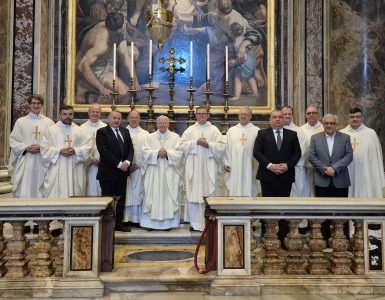Venerable Cardinal, dear Brothers in the Episcopate, dear friends!
I am very pleased to welcome today the participants of the Symposium on the Christian Heritage of European Culture in the minds of our contemporaries.
At the joint invitation of the Polish Institute of Christian Culture and the Pontifical Council for Culture, you have come here from various parts of this vast continent to reflect on the spiritual vitality of European culture, shaped by two millennia of Christian experience. The question that you ask yourselves in a penetrating and courageous way is: what concrete awareness of their Christian heritage do Europeans have? Recently, this problem has also been dealt with by several other symposia organized in Europe, at different levels of the hierarchy (bishops, priests).
At first glance, the balance sheet seems to contain as many highlights as shadows. On the one hand, one gets the impression that thousands of Europeans live in isolation from spiritual memory, like heirs who have squandered their sacred heritage. In fact, how many men and women work or rest without any reference to the Gospel or to God! Their joys, afflictions and hopes seem to be closed in the circle of earthly affairs, which causes many of them to live and die as if in a religious vacuum. This practical agnosticism, this calm indifference, is unfortunately often the drama of the most economically developed societies, which have eliminated the sacred from everyday life and are not yet able to create a religious space within new cultural models. How many young people grow up and breathe in this irreligious climate created by ignorance and indifference to religious matters!
(Speech to the participants in the Vatican Symposium, April 21, 1986)
“Do not cease in this good work. Papal Speeches to the John Paul II Foundation”
John Paul II Foundation & Centre for Documentation and Study of the Pontificate of John Paul II, Rome 2012





